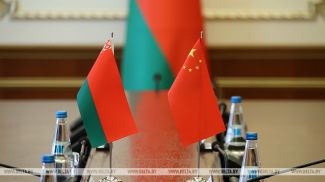MINSK, 2 August (BelTA) – The Economy Ministry has issued a newsletter that sets forth key measures to support the economy, businesses and households amidst the sanctions imposed by unfriendly nations, BelTA learned from the press service of the ministry.
The newsletter contains the main decisions taken by the head of state, the Council of Ministers and the operational headquarters under the government. The measures are focused on five priority targets: to bolster exports by expanding lending to exporters and reducing customs duties for imported goods that are needed to produce export-oriented goods, to build new transport and logistics chains, to encourage import substitution, to liberalize the business environment, to maintain stability of the labor market and the country's ability to fulfill its social security commitments,” the press service of the ministry informed.
The government is to address two strategic tasks set by the head of state: to mitigate the impact of the sanctions on households and to ensure stable operation of enterprises. All government agencies, deputies, parliamentarians, representatives of business and science are involved in the work. Regulations are passed and decisions are taken based on constant monitoring of the economic situation.
The measures to support businesses include changes in the public procurement mechanism, maintaining the same amount of the basic rental rate, postponing the deadline for the mandatory introduction of cash equipment by business entities, reducing the tax burden, extending the terms of investment projects, allowing businesses not to charge depreciation, allowing deferrals or installment programs for energy resources, minimizing the administrative burden, etc. Measures to support exporters are set out separately. Healthcare, transport, the real sector of the economy – the document covers everything. Measures have also been taken to protect the domestic market and regulate prices.
Social security is also an important area of concern. A variety of instruments is envisaged here: from granting individuals a deferral on loan payment, reducing heat and electricity tariffs, up to increasing the limit on duty-free import of parcels.
“The effective implementation of this complex of systemic and targeted decisions will help improve macroeconomic dynamics and restore GDP growth in the second half of 2022, boost employment, increase labor productivity and consequently salaries,” the Economy Ministry emphasized.













